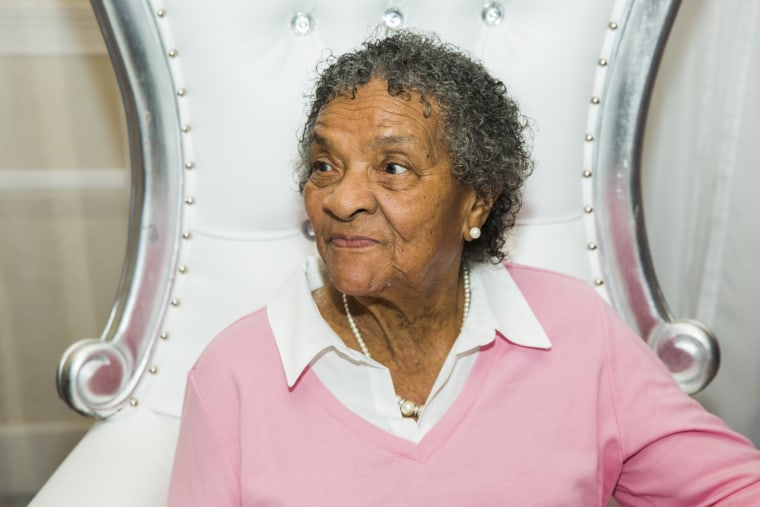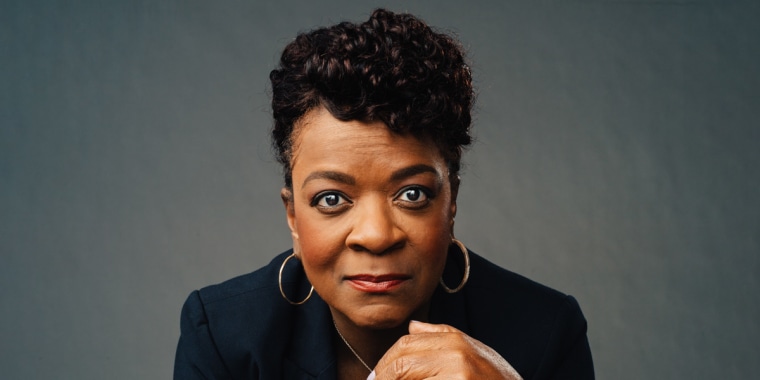It’s been a rough few months for Yvette Miley. But if anyone knows how to weather a storm, it’s her.
Since March, the senior vice president of diversity, equity and inclusion for NBCU News Group (MSNBC, CNBC and NBC News) has had six family members in Florida test positive for Covid-19, including her 90-year-old mom. In total, three family members spent a combined 67 days in the hospital, but thankfully all have fully recovered.
Despite difficulties on the home front, Miley is still one of the few employees who several times a week goes into the office at 30 Rock, where she heads diversity, equity and inclusion efforts across the NBCU News Group. And perhaps surprisingly, she says the global pandemic is not the greatest challenge of her career, which has spanned over three decades and counting.
“We have to, at some point, find ways to recreate ourselves sometimes and to adjust and change with the challenges, and find a way to break out of the boxes that people want to put us in,” Miley told Know Your Value founder and “Morning Joe” co-host Mika Brzezinski.
“I think that’s the spirit you must have in the face of any object or hurdle that comes your way. ‘I can't go this way, then I'm going to go this way.’ And know that there are going to be obstacles in your path, and you just have to find a way up, over, around, or under them to keep moving to your own truth," she added.
Brzezinski recently chatted with Miley about life and work during a global pandemic, how she was able to find her voice, confidence and more. Here’s their conversation, which has been edited for brevity and clarity:
Mika Brzezinski: How are you balancing the health issues that your family is confronting and work at 30 Rock?
Yvette Miley: You know, I find myself going into 30 Rock three to four times a week. There are a lot of safety precautions, and sometimes I do need to just get out of the house and into the office. And it has been an interesting time for my family, like a lot of families dealing with the different impacts of Covid-19. It has been navigating that and finding time, because it just feels as though the days are longer. And the boundaries between home and work are blurred. They seem to morph one into the other. So sometimes, I find going into the office helps me get back a little bit of the personal time that I need.
MB: That's got to be a lot for you. How is your mom doing?
YM: She is 90 years old and was in the hospital for two-and-a-half weeks. And at one point, they started having conversations with us about considering Hospice, because she wasn't eating and she was on a feeding tube. And we felt strongly that she's the toughest person we know, and that she was too tough for Covid-19, and she'd beat it. She came out of the hospital and is back to being her very feisty self.

MB: I think you might be the toughest person I know, but that is an amazing story. My mom's having a hard time and she hasn't even gotten Covid-19, but she’s having that sort of disorientation of not being around as many people as before. How has it been at 30 Rock? What’s the biggest challenge for you?
YM: It’s a challenge that has turned into a revelation — the way the technical teams were able to, almost on a dime, turn us into a work-from-home organization … Even though we're able to technically do it and pull off great shows, I think we all miss walking past the person in the hallway, having that eye contact and checking in and just saying, "Hey, how are you today?" And in this virtual world, I think that personal touch is what is really the challenge.
MB: Women are facing so many obstacles, especially amid Covid-19. I’ve found myself telling them over and over again, ‘it's a long road.’ What’s your advice about staying power for women in this business, or, for that matter, in any business?
YM: There have been so many opportunities that I've had over my career to opt out when I got the "no," or when I felt unwelcome in the room. I spent the first four years of my professional career, constantly apologizing and calibrating how I entered the room because I didn't want to be perceived as "You're a loud black woman.,” or “Oh, you're upset. You're an angry black woman."
I just spent so many times calibrating how people would respond to me that I couldn't find who I was. I was afraid. I had imposter syndrome. I was like, "I want to do this, I want to try that. But wait, you don't know enough yet. You're too young and you haven't experienced anything. You're not any good."
I’ve learned you first have to understand your own compass… Of course, you’re still trying to know yourself, but I think part of knowing yourself is also owning your own truth, being truthful with yourself. Like, “you know what, I'm really good at this. But I really suck at that.” And be OK with owning your truth, because then when you hear it or encounter it from someone else, you're already there. And knowing your truth means you also won't quit on yourself and you won't opt out when people are telling you, "no."
MB: Is there a presence you bring to the table? I mean, if you're in the middle of imposter syndrome, you fake it, until you make it. But you know, you got to make it, you got to get beyond imposter syndrome. How do you do that?
YM: It does go back to faking it until you make it. But do you speak confidently about your ideas? Because if you're not speaking confidently about your ideas, why should I believe it? I had to learn how to speak confidently about my ideas. Even to this very day, I often ask myself — before I'm going into a room, before I'm talking about something — “What am I going to say? Do I believe in what I'm saying?” Because otherwise, I shouldn't be saying it. Then I can stand confidently behind what I’m saying. I try to prepare myself for every meeting, even to this very day, 31 years in.
MB: How would you describe your mission now in your role?
YM: I think that my mission is to reach one, teach one. Like just to start with one person, just to make sure that when someone wants time, that I'm listening, learning and helping where I can. My mission is to not just be a mentor. My mission is to be an ally. My mission is to sponsor. My mission is to say your name when you're not in the room, to say, "Hey, this person deserves this opportunity in this job." That's what my purpose is, and I want to do my best to live up to that. You know, when I hit the lottery, go to a beach somewhere, I want my legacy to be that I was a person who helped other people find their way, their path and not to be an obstruction.
